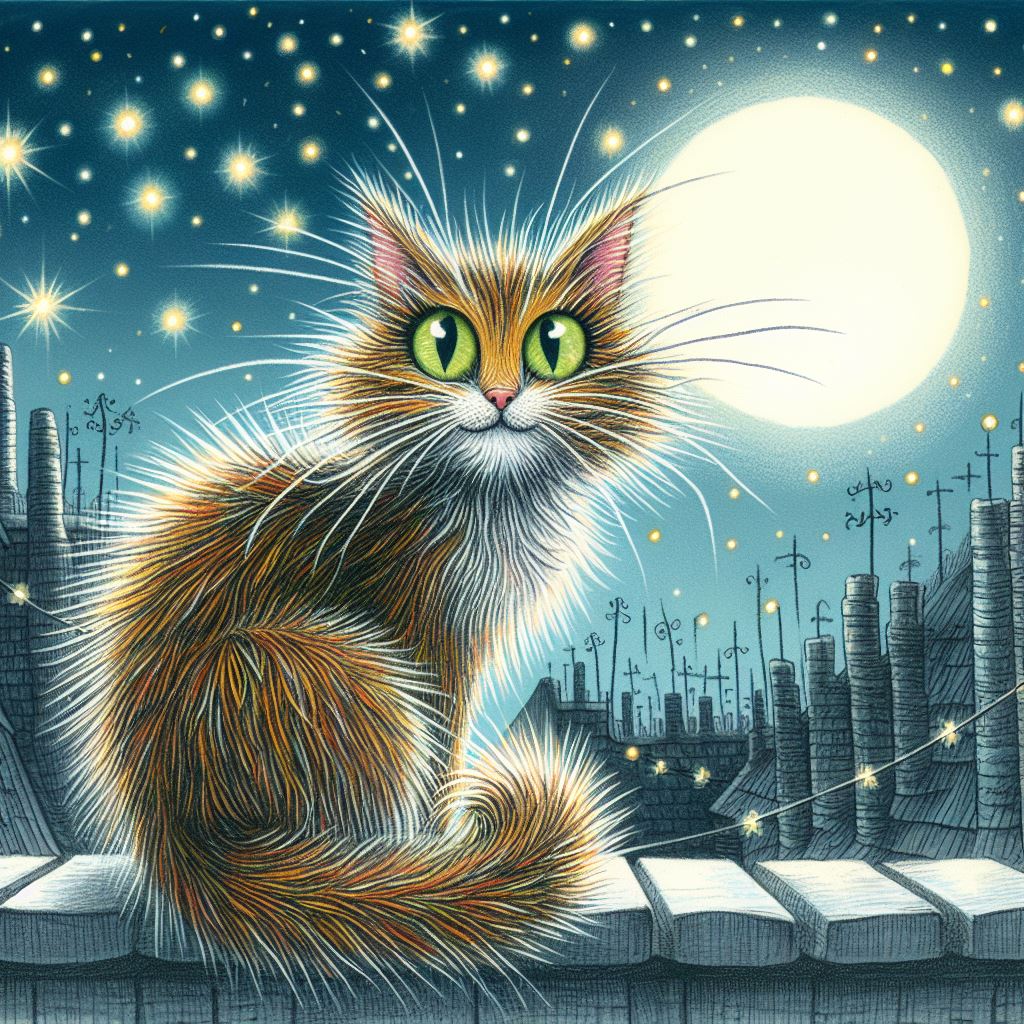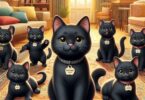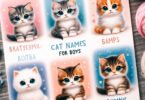The enigmatic world of “Cats” by T.S. Eliot and Andrew Lloyd Webber has captivated audiences for decades. Among its many enthralling elements are the Jellicle cats, each with a unique name that whispers of their personality and past. Delving into the etymology, cultural references, and hidden meanings behind these names offers a deeper appreciation for the rich tapestry of the Jellicle society.

A Jellicle by Any Other Name: A Look at Naming Traditions
Unlike the more standardized naming conventions of humans, Jellicle names appear to be a blend of personal choice, bestowed titles, and nicknames. The Jellicle Naming Ball itself hints at a celebration of individuality, where cats present themselves and their accomplishments for consideration by Old Deuteronomy.
- Self-Chosen Names: Some Jellicles, like Rum Tum Tugger, seem to have chosen names that reflect their personalities or desires. The name “Rum Tum Tugger” evokes a sense of mischief and a rebellious spirit.
- Descriptive Titles: Other names, like Gus, the Theatre Cat, are more descriptive, reflecting the cat’s role within the Jellicle community. These titles likely evolve over time, reflecting the cat’s experiences and contributions.
- Nicknames: A playful element is evident in nicknames like Skimbleshanks the Railway Cat and Old Deuteronomy. These nicknames might be bestowed by fellow Jellicles and could hint at a past adventure or a distinctive characteristic.
A Etymological Journey: Unpacking the Meanings
The names themselves often hold layers of meaning, drawing from various sources. Here’s a glimpse into some of the fascinating etymological origins:
- Old English Roots: Several names, like Munkustrap (monk + stray) and Grizabella (likely from “gris,” meaning gray), have roots in Old English, suggesting a long lineage within the Jellicle tribe.
- Literary References: “Old Deuteronomy” appears to be a play on the name of the Book of Deuteronomy, hinting at the character’s wisdom and authority.
- Nautical Inspiration: Names like Macavity (potentially derived from “mac” – a Scottish prefix for “son of” – and “cavity”) and Skimbleshanks (which might have nautical origins) could be linked to the cats’ interaction with the port or docks.
Beyond the Dictionary: Cultural Influences on Jellicle Names
The Jellicle names also seem to reflect broader cultural influences:
- Victorian Influence: The Victorian era, known for its fascination with felines, might have inspired names like Jennyanydots (referencing the “Old Possum” poem) and Victoria the White Cat.
- Theatrical Allusions: “Cats” being a musical, some names might be subtle nods to the theatrical world. “Grizabella” could be a play on the Italian word “griselda,” meaning patient, alluding to her perseverance.
Unveiling the Secrets of Jellicle Names
| Jellicle Cat | Possible Etymology/Meaning | Cultural Reference |
|---|---|---|
| Rum Tum Tugger | Onomatopoeia suggesting rebelliousness | – |
| Gus, the Theatre Cat | Descriptive title reflecting role | Theatre |
| Skimbleshanks the Railway Cat | Nautical term (unconfirmed) | Industrial Revolution |
| Old Deuteronomy | Play on “Book of Deuteronomy” | Religion |
| Munkustrap | Monk (religious connotation) + stray | Old English |
| Grizabella | “Gris” (French for gray) + possible reference to “Griselda” | Victorian literature/Italian language |
| Jennyanydots | Reference to “Old Possum” poem | Victorian literature |
| Victoria the White Cat | Victorian Era | |
| Macavity | “Mac” (Scottish) + “cavity” | – |
A Symphony of Personalities: How Names Paint a Picture
The chosen names paint a vivid picture of each Jellicle’s personality. Consider the following:
- The Glamour Cats: Names like Victoria and Bombalurina evoke a sense of sophistication and theatricality.
- The Rogues Gallery: Names like Macavity and Skimbleshanks hint at cunning and resourcefulness.
- The Forgotten Souls: Names like Grizabella and Gus carry a melancholic undertone, reflecting their struggles.
The Power of a Name: The Jellicle Naming Ball and Identity
The Jellicle Naming Ball becomes a powerful symbol of self-discovery and acceptance. Each cat, through their name and performance, presents their unique essence to the Jellicle Choice. The “Jellicle
Beyond the Basics: Exploring Wordplay and Onomatopoeia
T.S. Eliot, a master of language, employs wordplay and onomatopoeia to further enrich the Jellicle names.
- Wordplay:
- “Old Deuteronomy” – The name plays on the weight and authority of the Deuteronomic code in the Bible.
- “Munkustrap” – A clever combination of “monk” (religious connotation) and “stray” (independent spirit).
- “Growltiger” – The name evokes a guttural growl, hinting at the cat’s ferocity.
- Onomatopoeia:
- “Rum Tum Tugger” – The name itself has a rhythmic quality, suggesting a restless, energetic cat.
- “Skimbleshanks” – The name has a hurried, almost clattering sound, mirroring the fast-paced life of a railway cat.
A Global Tapestry: International Variations in Jellicle Names
The magic of “Cats” lies in its international appeal. Interestingly, the Jellicle names undergo fascinating transformations across different languages.
- French: In the French production, “Munkustrap” becomes “Mistoffelees,” a name with a more magical and mysterious aura.
- Japanese: The Japanese translation takes a more descriptive approach, with “Old Deuteronomy” becoming “The Great Leader Deuteronomy.”
- German: The German production retains some names like “Grizabella” but renames “Rum Tum Tugger” to “Rafferty,” a name with a more mischievous connotation.
These variations highlight the adaptability of the Jellicle names while retaining their core essence.
A Legacy of Names: The Enduring Appeal of Jellicle Nomenclature
The enduring appeal of Jellicle names lies in their ability to spark the imagination. They are more than just labels; they are portals into the rich tapestry of Jellicle lives. Each name, with its hidden meanings and cultural references, invites the audience to delve deeper into the world of “Cats.”
Unanswered Questions and Room for Interpretation
The beauty of the Jellicle names lies partly in their ambiguity. The exact origins of some names, like Macavity, remain open to debate. This ambiguity allows fans to create their own interpretations, fostering a sense of community and shared passion for the Jellicle world.
Conclusion
The seemingly whimsical names of the Jellicle cats hold a universe of meaning within them. From their etymological roots to their cultural references, each name contributes to the richness and depth of the “Cats” experience. By unraveling the secrets behind these names, we gain a deeper appreciation for the individuality and stories of each Jellicle cat, ultimately enriching our understanding of the entire Jellicle society.
FAQs
- What is the significance of the Jellicle Naming Ball?
The Jellicle Naming Ball serves as a ceremony where each cat presents their accomplishments and personality for consideration by Old Deuteronomy. It’s a symbolic act of self-discovery and acceptance within the Jellicle society.
- Do all the Jellicle names have hidden meanings?
While some names like Munkustrap and Grizabella have clear etymological roots, others, like Macavity, remain open to interpretation. This ambiguity allows for fan theories and a deeper engagement with the “Cats” universe.
- How do the Jellicle names vary across different productions?
The Jellicle names are often adapted to suit the cultural context of different languages. Some translations remain faithful to the originals, while others take a more descriptive or evocative approach.
This article provides a springboard for further exploration. For additional information, consider delving into the etymology of specific names, researching cultural references in more detail, or exploring how Jellicle names are translated and adapted in different languages. The world of Jellicle names offers a treasure trove of details waiting to be discovered.
Delving Deeper: A Look at Specific Names and Their Potential Origins
While the previous sections offered a general overview of Jellicle names, here’s a closer look at some intriguing names and the potential stories they hold:
- Munkustrap: This name’s religious connotation (“monk”) might suggest a past association with a monastery or a Jellicle with a more philosophical bent. The “stray” element could indicate a later break from that life, embracing a more independent existence within the Jellicle tribe.
- Growltiger: The name’s ferocity (“growl”) is counterbalanced by the playful suffix “-tiger.” This duality could reflect a Jellicle who is both a formidable fighter and a playful companion.
- Rum Tum Tugger: Theories abound regarding this name’s origin. Some suggest it’s a Romani term for a troublemaker, aligning with the character’s rebellious spirit. Others see it as onomatopoeia, mimicking the sound of a restless cat.
- Jennyanydots: This name is a direct reference to T.S. Eliot’s poem “Old Possum’s Book of Practical Cats,” where “Old Possum” instructs cats on various skills like catching mice. Jennyanydots embodies these skills, transforming from Gumbie cat by day to the “Gumbie cat for hunting” by night.
Exploring the Naming Process: A Speculative Journey
The process by which Jellicles acquire their names remains shrouded in mystery. Here are some possibilities:
- Kittenhood Names: Perhaps kittens receive their initial names from their Jellicle mothers, with these names evolving over time as the cats develop their personalities and roles within the tribe.
- Earning Your Name: It’s possible that Jellicles earn their names through significant deeds or accomplishments. A particularly cunning cat might be dubbed “Macavity” after a clever exploit.
- Collective Wisdom: The Jellicle Naming Ball itself could be a collaborative effort, with the assembled Jellicles offering suggestions and ultimately deciding on a name that best reflects the cat’s essence.
The Jellicle Name as a Living Legacy
A Jellicle’s name is not static; it evolves throughout their life. Victories, failures, and experiences all contribute to shaping the way a name is perceived within the Jellicle society.
- Nicknames and Titles: As mentioned earlier, nicknames like “Old Deuteronomy” likely arise organically, reflecting the cat’s position within the Jellicle hierarchy.
- Evolving Reputation: A name like “Rum Tum Tugger” might initially suggest a mischievous kitten, but as the cat matures and proves its loyalty, the name could take on a more playful and endearing connotation.
The Power of Names in Storytelling
The success of the Jellicle names lies in their ability to serve multiple purposes within the narrative:
- Characterization: A name like “Grizabella” instantly conveys a sense of melancholy and past struggles.
- World-Building: Names like “Gus, the Theatre Cat” provide glimpses into the diverse roles and occupations within Jellicle society.
- Emotional Resonance: Names like “Victoria” evoke a sense of elegance and beauty, drawing the audience into the glamorous world of the Jellicle Jellicles.
Conclusion
The seemingly simple names of the Jellicle cats hold a depth of meaning and intrigue. By exploring their etymology, cultural references, and potential evolution throughout a cat’s life, we gain a richer understanding of the “Cats” universe. The Jellicle names serve as a testament to T.S. Eliot’s masterful storytelling and his ability to breathe life into a world where even the most whimsical detail holds a deeper significance.






